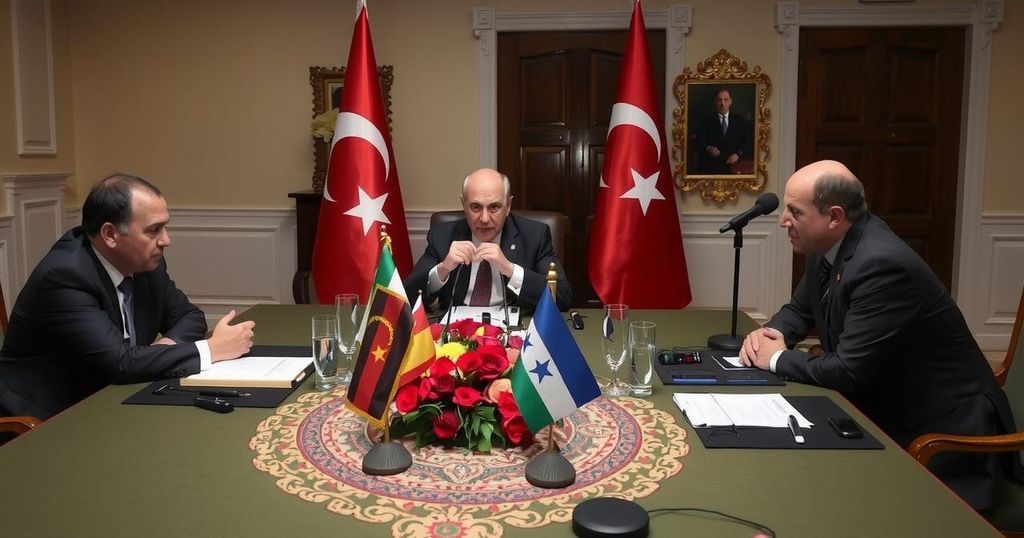Key International Perspectives on Syria’s Unity and Future Governance

Egypt’s Al-Sisi highlights the critical need for Syria’s territorial unity amid calls for international collaboration in reconstruction from Turkey’s Erdoğan. Syrian opposition leader Jamous advocates for transitional justice and inclusive governance, while international responses stress humanitarian needs and sanctions re-evaluation. France signals renewed diplomatic engagement, emphasizing an inclusive political process in Syria.
Egyptian President Abdel Fattah Al-Sisi has recently underscored the critical importance of preserving Syria’s territorial integrity during a conversation with Cypriot President Nikos Christodoulides. Al-Sisi emphasized the need to launch a comprehensive political dialogue that includes diverse Syrian voices. On a parallel note, Turkish President Recep Tayyip Erdoğan has urged for international cooperation to aid in Syria’s reconstruction, asserting Turkey’s commitment to combating terrorism and restoring stability in the country. Notably, Erdoğan pointed out ongoing military operations against the YPG and PKK, organizations Turkey designates as terrorist groups.
Bader Jamous, chairman of the Syrian Negotiation Commission, highlighted that transitional justice in Syria is essential, insisting on continued legal actions against the previous regime and President Bashar Al-Assad. He advocated for a national transitional government that would adequately represent all Syrian factions and called for a national conference to establish a constituent assembly responsible for drafting a new constitution. Furthermore, Jamous urged the necessity of conducting free elections monitored by the UN after constitutional approval, reaffirming their commitment to Security Council Resolution 2254.
International responses have varied, with Russia’s UN representative Vasily Nebenzya stressing the need to maintain Syria’s state institutions while urging the lifting of sanctions. Conversely, UN Special Envoy Geir Pedersen noted that progress towards a credible political transition in Syria is vital for attracting the necessary economic support, which requires a collaborative effort and a reassessment of sanctions.
In the humanitarian sphere, UN Under-Secretary-General Tom Fletcher raised alarms about the dire humanitarian situation in Syria, indicating that over 70% of the population currently requires assistance. He reported significant displacement and shortages of essential supplies.
France appears to be re-engaging with the Syrian situation, having sent diplomats to meet with representatives of the transitional authorities, emphasizing the need for a non-exclusionary political process. Notably, the French flag was raised at its embassy in Damascus for the first time in twelve years, signaling potential shifts in diplomatic relations. Despite these gestures, France continues to assert that an effective political transition must be inclusive and aligned with UN frameworks.
The ongoing crisis in Syria, which began in 2011, has resulted in a complex humanitarian and political landscape. Various nations are actively involved in the discourse surrounding the future of Syria, aiming to restore stability and governance. The country’s territorial integrity continues to be a pivotal concern for allied nations, as external interventions by multiple countries, including Turkey and Russia, have profoundly influenced the nation’s political dynamics. Significant resolutions, such as UN Security Council Resolution 2254, provide frameworks for a potential transition, highlighting the necessity for inclusive governance and legal accountability in post-conflict Syria. The humanitarian situation remains critical, underscoring an urgent need for international support and reconstruction efforts.
The current discourse surrounding Syria’s future reflects a growing consensus on the need for unity and inclusive governance. Leaders like Al-Sisi and Erdoğan emphasize the importance of preserving Syria’s integrity while advocating for international collaboration in reconstruction efforts. The Syrian Negotiation Commission’s insistence on transitional justice and adherence to UN resolutions underlines the essential steps needed for a credible political solution. As humanitarian crises unfold, the international community’s engagement will be key in addressing the urgent needs of the Syrian populace and fostering a pathway towards peace and stability.
Original Source: www.dailynewsegypt.com








